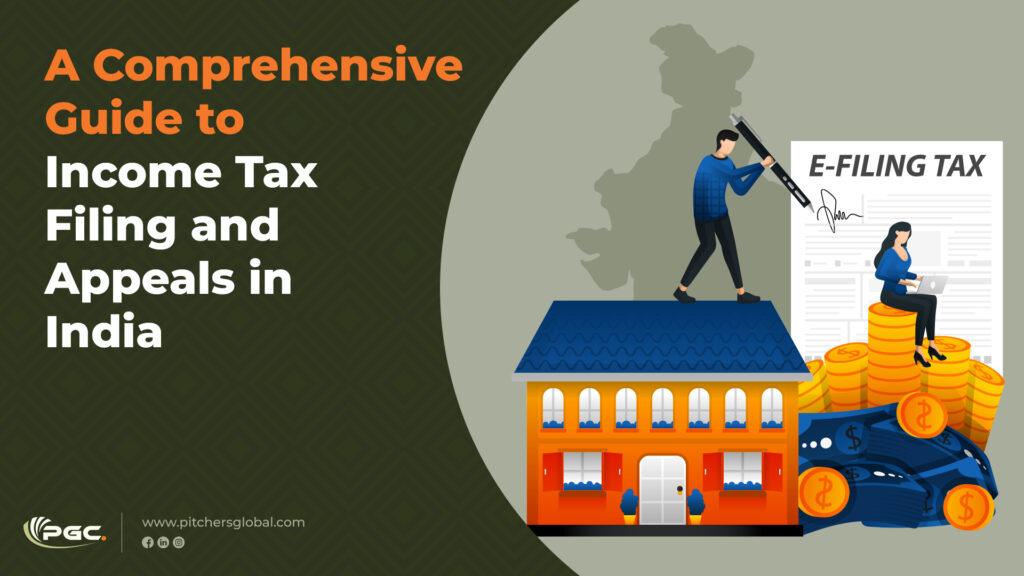Taxpayers in India must follow a structured process for filing income tax returns and appealing assessments under the Income Tax Act. Understanding this Guide to Income Tax Filing and Appeals in India these steps helps ensure compliance and protects taxpayer rights.

A Comprehensive Guide to Income Tax Filing and Appeals in India
Income Tax Return (ITR) Filing
- Authority: Returns are filed electronically via the Income Tax Portal.
- Relevant Section: Section 139 of the Income Tax Act.
- Deadlines:
- Individuals: July 31st (subject to extensions).
- Businesses: September 30th (subject to extensions).
- Individuals: July 31st (subject to extensions).
- Post-Filing Process:
- Section 143(1) – Intimation Notice: The Income Tax Department automatically processes returns, adjusting any discrepancies like mismatched TDS or calculation errors.
- Section 143(2) – Scrutiny Notice: If selected, the Assessing Officer (AO) issues a notice within three months, requesting additional documents.
- Section 144 – Best Judgment Assessment: If a taxpayer fails to respond, the AO makes an assessment based on available records, possibly resulting in additional tax liability.
- Section 143(1) – Intimation Notice: The Income Tax Department automatically processes returns, adjusting any discrepancies like mismatched TDS or calculation errors.
Assessment Order
- Authority: Issued by the Assessing Officer (AO).
- Relevant Sections:
- Section 143(3): A final assessment order is issued after scrutiny, detailing the tax liability.
- Section 147: If income has escaped assessment, reassessment proceedings may be initiated within 10 years for high-value cases.
- Sections 156 & 157: Demand notices are issued for additional tax, requiring payment or appeal.
- Section 143(3): A final assessment order is issued after scrutiny, detailing the tax liability.
- Timelines:
- Normal cases: Orders must be issued within 21 months from the end of the assessment year.
- Search-related cases: The timeline is 18 months.
- Normal cases: Orders must be issued within 21 months from the end of the assessment year.
First Appeal: Commissioner of Income Tax (Appeals) [CIT(A)]
- Authority: CIT(A) handles first-level appeals.
- Relevant Sections: Sections 246A, 249.
- Deadline: Appeals must be filed within 30 days of receiving the assessment order.
- Filing Requirements:
- Form 35 submission.
- Fees based on income:
- ₹250 (income ≤ ₹1 lakh)
- ₹500 (income ₹1–2 lakh)
- ₹1,000 (income > ₹2 lakh)
- ₹250 (income ≤ ₹1 lakh)
- Form 35 submission.
- Process: The CIT(A) reviews the appeal, holds hearings, and issues an order under Section 250.
Second Appeal: Income Tax Appellate Tribunal (ITAT)
- Authority: The ITAT, a quasi-judicial body, hears appeals against CIT(A) decisions.
- Relevant Section: Section 253.
- Deadline: Appeals must be filed within 60 days of the CIT(A) order.
- Filing Requirements:
- Form 36 submission.
- Fees:
- ₹500 (income ≤ ₹1 lakh)
- ₹1,500 (income ₹1–2 lakh)
- 1% of assessed income (max ₹10,000) (income > ₹2 lakh)
- ₹500 (income ≤ ₹1 lakh)
- Form 36 submission.
- Outcome: ITAT decisions are binding on factual matters but can be challenged in the High Court for legal issues.
Appeal to the High Court
- Authority: Jurisdictional High Court.
- Relevant Section: Section 260A – Appeals are allowed only for substantial questions of law.
- Deadline: Appeals must be filed within 120 days from the ITAT order.
- Requirement: A memorandum of appeal outlining legal issues.
- Outcome: The High Court interprets tax laws and hears cases where the tax effect exceeds ₹50 lakh in departmental appeals.
Appeal to the Supreme Court
- Authority: Supreme Court of India.
- Relevant Sections:
- Section 261: Appeals require High Court certification.
- Article 136 of the Constitution: Allows a Special Leave Petition (SLP) for significant legal or constitutional matters.
- Section 261: Appeals require High Court certification.
- Deadline: Must be filed within 90 days from the High Court’s judgment.
- Outcome: The Supreme Court may either dismiss the appeal or hear cases with critical tax law implications.
Guide to Income Tax Filing and Appeals – Conclusion
Navigating the tax filing and appeal process is essential for compliance and safeguarding taxpayer rights. Timely action and proper documentation can prevent disputes and ensure smoother resolution. Seeking professional legal assistance can be beneficial in complex cases.
Get in touch with Pitchers Global today!
